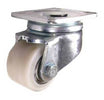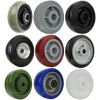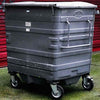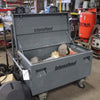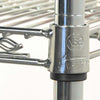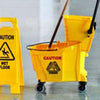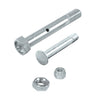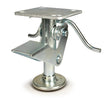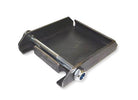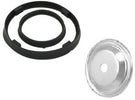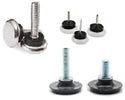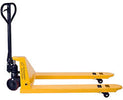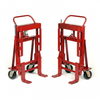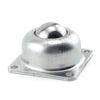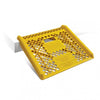Wheel Types Explained:
Thermoplastic Rubber (TPR): These wheels combine the advantages of both a hard & soft tread material in a single wheel, making it one of our favorite caster wheels. Like a hard tread wheel, thermoplastic rubber rolls easily and is very durable. Like a soft tread wheel, it is quiet, protects floors, and has a cushioned ride. These caster wheels also hold up well when exposed to weather, are resistant to chemicals, water, & steam, and reject floor debris. We highly recommend these caster for applications requiring non-marking, floor protective, quiet, and smooth rolling wheels.
Rubber on Aluminum: These wheels have an attractive finish and offer a smooth, quiet, & cushioned ride that will protect floors. They are also lightweight and resistant to corrosion & rust. Because of these many features, they are considered an upgrade from the rubber on nylon / cast iron core wheels. The wheels with grey treads are non-marking while the wheels with black treads could leave marks on your floor much like a car tire leaves marks on the ground when they skid. We recommend these wheels for customers seeking a nicer looking, better grade rubber wheel when compared to the rubber on nylon or cast iron core wheels.
Rubber on Nylon: These wheels offer a smooth, quiet, & cushioned ride that will protect floors for an economical price. The nylon core provides equivalent load and impact capacities when compared to cast iron cores, but is rust free and can be used for applications requiring wash downs, high humidity, and outdoor environments. These wheels have a black tread that could leave marks on your floor much like a car tire leaves marks on the ground when they skid. If you need a non-marking rubber wheel, check out our thermoplastic rubber wheels. We recommend these wheels for customers needing a good all-around rubber wheel.
Rubber on Cast Iron: These wheels have the same rubber tread as the rubber on nylon wheels, but are molded onto a cast iron core. These wheels are popular as you get in to the larger diameter rubber wheels, such as 10" and up. We can provide these rubber wheels in smaller sizes, but the rubber on nylon core wheels have been proven a superior product in the smaller sizes so we do not regularly keep them in inventory. These wheels could leave marks on your floor much like a car tire leaves marks on the ground when they skid. We recommend these wheels for customers needing larger diameter rubber wheels.
Hard Rubber: These wheels are designed to handle lighter capacities, with the maximum capacities topping out at 300 lbs. They are economically priced and work well in outdoor or indoor environments, rolling well over small debris, rough floors, cracks, and floor joints. These wheels have a black tread that could leave marks on your floor much like a car tire leaves marks on the ground when they skid. We recommended hard rubber wheels for general duty applications.
Soft Rubber: Almost identical to hard rubber wheel, these soft rubber wheels possess all of the same qualities, but offer a softer tread which produces a smoother, quieter rolling wheel. However, the softer treads reduce capacity and are also more prone to flat spot if left in the same place for long periods of time. We recommended soft rubber wheels for general duty applications.
Neoprene Rubber: These wheels are the premier wheel type for smooth, quiet, and shock absorbing rolling. Its soft tread will protect the floor and also withstands wear, abrasion, oil, grease, and most chemicals. The tread is non-staining, but could leave marks on the floor if the wheels skids or is drug sideways. These wheels are particularly popular in the theater type industries and are recommended where maximum noise reduction and shock absorbing are critical.
Elastic Rubber: These wheels are the pinnacle of quality. They are very similar to thermoplastic rubber wheels in that they have a soft tread, are quiet, protects floors, and have cushioned ride. The difference is the super elastic tread provides higher capacities and the easiest rolling soft tread wheel available. The only potential downside to this wheel is price. If this caster wheel doesn't fit your budget, check out the thermoplastic rubber wheels.
Conductive Rubber: These wheels are designed to eliminate static build-up and discharge. They meet the federal ESD standard of FF-C-88C and are a specialty wheel. Conductive rubber wheels are most often used by electronic companies or where sensitive electronics are found.



